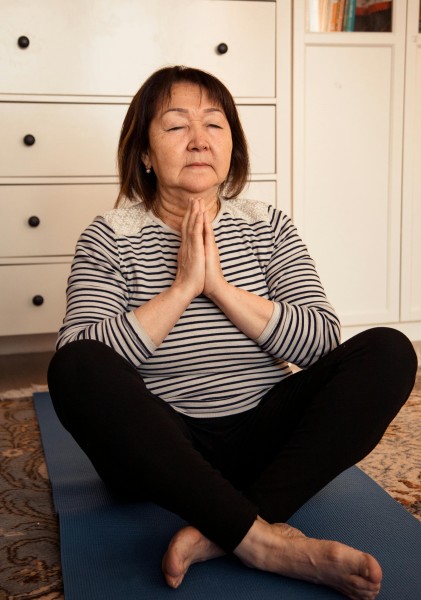As women transition into menopause, they are often prepared for the physical changes that accompany this natural stage of life.

However, many are taken by surprise by the emotional and psychological changes that can be just as impactful.
Menopause-related anxiety is a significant concern that can affect quality of life, relationships, and overall well-being.
This article aims to shed light on the intricacies of anxiety during menopause, offering insights and strategies for those seeking understanding and relief.
The Emergence of Menopause-Related Anxiety
Menopause marks the end of a woman’s reproductive years and is characterized by the cessation of menstruation.
This period is defined by hormonal fluctuations that can have far-reaching effects beyond physical symptoms like hot flashes and sleep disturbances.
These hormonal changes can also lead to feelings of anxiety, which for some women may be a new experience, while for others, it may exacerbate existing anxiety issues.
The connection between menopause and increased anxiety is multifaceted. The decline in estrogen levels can directly impact mood regulation and stress response.
Estrogen interacts with neurotransmitters responsible for mood, including serotonin, dopamine, and norepinephrine.
As levels of this hormone fluctuate and ultimately decrease, women may experience mood swings, heightened emotional sensitivity, and anxiety.
Exploring the relationship between hormonal fluctuations and anxiety introduces the potential for targeted supplement use.
Investigate supplements formulated to support hormonal balance and mood regulation during menopause.
Recognizing the Symptoms of Menopause-Related Anxiety
Menopause-related anxiety can manifest in various ways, with symptoms ranging from mild unease to full-blown panic attacks.
Common signs include constant worry, irritability, difficulty concentrating, restlessness, and a feeling of being ‘on edge.’
Physical symptoms may also present themselves, such as heart palpitations, muscle tension, rapid breathing, and gastrointestinal issues.
It’s crucial for women and their loved ones to recognize these symptoms as potential indicators of menopause-related anxiety, which is a vital step towards seeking help and managing the condition.
The Impact of Lifestyle and Stress
Lifestyle factors play a significant role in the experience of anxiety during menopause.
High-stress environments, either at work or home, can intensify feelings of anxiety.
Moreover, lifestyle habits, such as caffeine and alcohol consumption, lack of exercise, and poor sleep hygiene, can all contribute to or worsen anxiety symptoms.
Recognizing and adjusting these habits is an integral part of managing menopause-related anxiety.
Addressing lifestyle and stress factors in menopause also opens the door to the use of adaptogenic supplements, which can help the body resist stressors.
The Role of Sleep in Menopause-Related Anxiety
Sleep issues are a common complaint during menopause, with many women experiencing insomnia or disrupted sleep patterns due to night sweats and other discomforts.
Poor sleep can exacerbate anxiety, creating a vicious cycle where anxiety leads to sleep disturbances, which in turn leads to more anxiety.
Addressing sleep issues is, therefore, a critical component of managing anxiety during menopause.
Holistic Approaches to Managing Anxiety
A holistic approach to managing menopause-related anxiety involves looking at the whole person—body, mind, and spirit—and considering how various health practices can work together to reduce anxiety.

Techniques such as mindfulness meditation, deep breathing exercises, and yoga can help alleviate stress and promote relaxation.
Additionally, therapies such as Cognitive Behavioral Therapy (CBT) have been proven effective in treating anxiety by helping to change negative thought patterns and behaviors.
Including holistic approaches to anxiety management during menopause can be significantly enhanced by supplements that support brain health and emotional balance.
Nutritional Strategies for Anxiety Reduction
Diet also plays a role in managing anxiety.
A balanced diet that includes a variety of nutrients can help stabilize mood and reduce anxiety. Some research suggests that certain foods, such as those rich in omega-3 fatty acids, can be beneficial for mental health.
On the other hand, reducing intake of sugar, processed foods, and caffeine can help minimize anxiety symptoms.
The Importance of Social Support
Social support is an invaluable resource for women experiencing menopause-related anxiety. Sharing concerns with friends, family, or support groups can provide emotional relief and practical advice.
It is also an opportunity to connect with others going through similar experiences, which can be incredibly reassuring.
Seeking Professional Help
While lifestyle changes can make a significant difference in managing menopause-related anxiety, it is also essential to recognize when to seek professional help.
Healthcare providers can offer a range of treatments, including counseling, medication and other therapies tailored to individual needs.
It’s crucial to consult with a healthcare professional if anxiety symptoms persist or worsen, as they can assess for other possible causes and provide appropriate treatment.
Understanding Hormonal Therapies
Hormone Replacement Therapy (HRT) may be recommended for some women to alleviate the hormonal fluctuations that contribute to anxiety during menopause.
HRT can help stabilize mood swings and provide relief from other menopausal symptoms that may be indirectly exacerbating anxiety, such as hot flashes and insomnia.
However, the decision to use HRT should be made after a thorough discussion with a healthcare provider, considering the potential benefits and risks.
Complementary and Alternative Medicine (CAM)
For those seeking natural remedies, Complementary and Alternative Medicine offers a variety of options.
Herbal supplements are an excellent for menopause induced anxiety.
Additionally, there are traditional supplements use for anxiety like black cohosh, St. John’s Wort, and valerian root are commonly used to address menopausal symptoms, including anxiety.
However, it’s essential to approach these remedies with caution and under professional guidance, as they can interact with other medications and aren’t suitable for everyone.
The Power of Exercise in Alleviating Anxiety
Regular physical activity is one of the most effective ways to combat menopause-related anxiety.
Exercise releases endorphins, natural mood lifters that can also act as natural painkillers.
Activities such as brisk walking, cycling, swimming, or any aerobic exercise can have significant anti-anxiety effects.
Furthermore, strength training and flexibility exercises can improve overall well-being and help manage anxiety.

The Connection Between Mindfulness and Anxiety Relief
Mindfulness practices have gained attention for their ability to reduce anxiety.
Mindfulness meditation, in particular, encourages individuals to focus on the present moment, which can help break the cycle of worry and negative thinking that often accompanies anxiety.
Mindfulness can be practiced through meditation, but also through mindful eating, walking, or any activity done with intentional awareness.
The Role of Self-Care in Managing Anxiety
Self-care is a critical factor in managing menopause-related anxiety.
This encompasses a range of practices, including ensuring enough rest, engaging in hobbies, and setting aside time for relaxation and reflection.
Self-care also means setting boundaries and learning to say no, to reduce stress levels and prevent overcommitment.
Building a Menopause-Related Anxiety Management Plan
Creating a management plan tailored to an individual’s life and symptoms can be an effective way to tackle menopause-related anxiety.
This plan may include a combination of medical treatments, lifestyle changes, support systems, and coping strategies.
Tracking symptoms and triggers can also provide valuable insights into what exacerbates or eases anxiety, helping to refine the management plan over time.
Parting Thoughts: Embracing Change with Confidence
Menopause is a time of change, and with change can come uncertainty and anxiety.

However, by understanding the connection between menopause and anxiety and utilizing the array of management strategies available, women can navigate this transition with confidence.
It’s about finding balance, seeking support, and taking proactive steps towards mental and physical health.
With the right tools and resources, menopause-related anxiety can be managed effectively, allowing women to continue to live fulfilling and vibrant lives.
In summary, menopause-related anxiety is a complex issue that arises from the interplay of hormonal changes, lifestyle factors, and individual psychology.
By acknowledging and addressing these challenges head-on, with the support of healthcare professionals and personal networks, women can mitigate the impact of anxiety and emerge from this life transition stronger and more resilient.
This article has aimed to provide a comprehensive understanding of menopause-related anxiety and the many ways to manage it, offering hope and guidance for those affected.
Embracing menopause with confidence is facilitated by understanding the supportive role supplements can play in managing anxiety and other symptoms.
As with any medical issue, it’s always best to consult with a healthcare provider for advice tailored to your specific situation.